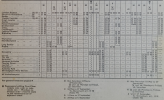Normal pattern during the 1970s was the **10 past the hour services from Euston ran to Birmingham New Street, and the **40 past the hour ran to Wolverhampton. Coming up the Wolverhampton services generally left there at **29 past the hour, and arrived at Euston in just under the two hours at **24 past the hour. The Birmingham services departed at **18 past the hour taking just over the hour and a half to arrive at **54 past the hour. Some Early Morning and Evening Birmingham services were extended to/from Wolverhampton. While most only called at Coventry, Birmingham International, and Birmingham, during the early morning the Down trains called at Watford to pick up, and the late evening services called at Watford to Set Down. The odd service made a call at Rugby. The 0010 Wolverhampton called at Watford, Bletchley, Northampton, Rugby, Coventry, Birmingham International and Birmingham New Street.
There were only a handful of class 1s that called at Bletchley (before Milton Keynes opened), and were usually the Carlisle/Blackpool services, and even then it was just early morning and Late evening.
The **54 arrivals from Birmingham made the next **40 past back to Wolverhampton, and the **24 arrivals from Wolverhampton made the next **10 past the hour to Birmingham.
The services were normally 86/2 hauled with the odd 87 turning up. Only some of the very late evening trains produced the odd 85, where the sets were often Mark 1 or early Mark 2 types. Other AC types would sometimes turn up as a last minute substitute for a failure.
At that time there was just one weekday Shrewsbury working on the Up being the 0740 off there arriving at Euston at 1019, the return being the 1740 back to Shrewsbury. On Summer Saturdays the 0940 ran to Aberystwyth, an Up Working leaving there at 1000 and arriving in Euston at 1524. Both these trains normally were formed of Mark 1 sets rather than the weekday later Mark 2 types.
Then of course there were the hourly EMU 'Stoppers' taking around two and a half hours routed via Northampton and calling at most of the intermediate stations. The **21 past the hour from Birmingham would arrive at Euston at **54 past the hour, turning round to make the **05 past the hour back to Birmingham via Northampton. They were mostly 310s, with the odd 304 turning up occasionally.

